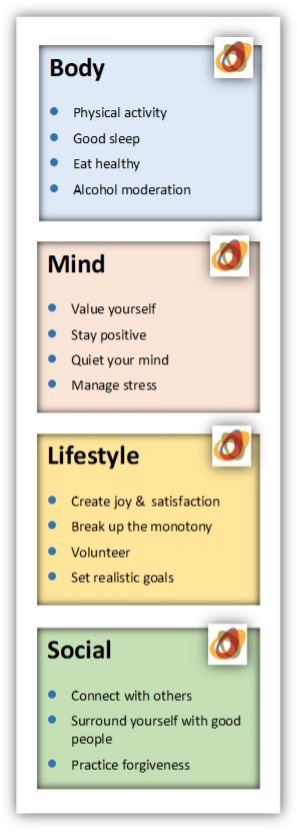What a year it’s been. An onslaught of disruption that has impacted our physical health, careers, finances, education, social activities, and friendships. For many, the pandemic has left lingering hardships. For some it has meant the loss of loved ones.
Now, as the pandemic loosens its grip, and life gets back to normal, it’s a good time to (1) Assess the lives we’re living in terms of our mental health, and (2) address the underlying factors – the activities, habits, thoughts, emotions, and behaviors – that have an impact on our mental health. This conscious effort towards improving our physical, mental, and emotional well-being is called self-care.
Mental Health Begins with Self-Care
Not unlike our physical, financial or spiritual health, our mental health is significantly impacted by the way we conduct our lives. Just as good spending habits improve our financial well-being, or attending worship services might enhance our spiritual well-being, our mental well-being is dependent on foundational aspects of living, such as: good physical health, positive attitudes, active and productive lifestyles, and strong social connections. Mental well-being might also be dependent on overcoming negative foundational aspects such as alcohol or drug abuse, cognitive distortions, or isolation.
Assess, Then Address
 The graphic to the right is a helpful guide for assessing these fifteen foundational aspects for good mental health. Each can be considered in terms of:
The graphic to the right is a helpful guide for assessing these fifteen foundational aspects for good mental health. Each can be considered in terms of:
- Its current state as a strength or weakness in the way you conduct your life.
- The effort that would be required to make changes for meaningful, lasting improvements.
- The subsequent impact a meaningful change would make in one’s mental health and quality of life.
Once these foundational self-care aspects have been assessed, a plan can be created to address those aspects where the positive impact is highest for a given amount of effort. Any plan should be reasonable in terms of the effort required, yet meaningful, resulting in a real positive impact on one’s mental health and quality of life. To increase the chances of making long lasting positive changes, consider the following:
- Start with small changes
- Accept the inevitable setbacks
- Track your progress
- Reward yourself for successes
Get Help When Needed
Self-care can make significant improvements in one’s mental health and quality of life. Sometimes it is all that is needed to get one’s life back on track. More often, it is a strategy used in conjunction with therapy. Symptoms that would suggest a need for help above and beyond self-care include:
- Changes in mood, appetite, energy, activities, and sleep
- Difficulty in making decisions or concentrating
- Worsening of underlying health issues
Therapy and self-help complement each other. If you or someone you know are experiencing mental health issues, consider scheduling a teletherapy appointment to come up with a treatment plan that can help address the issues.
How to Start the Healing
Beginning the process is easy. Learn more about our Providers (Click Here).
For Teletherapy details (Click Here) or Teletherapy instructions (Click Here)
Call us at 952-224-8990 to make an appointment.






